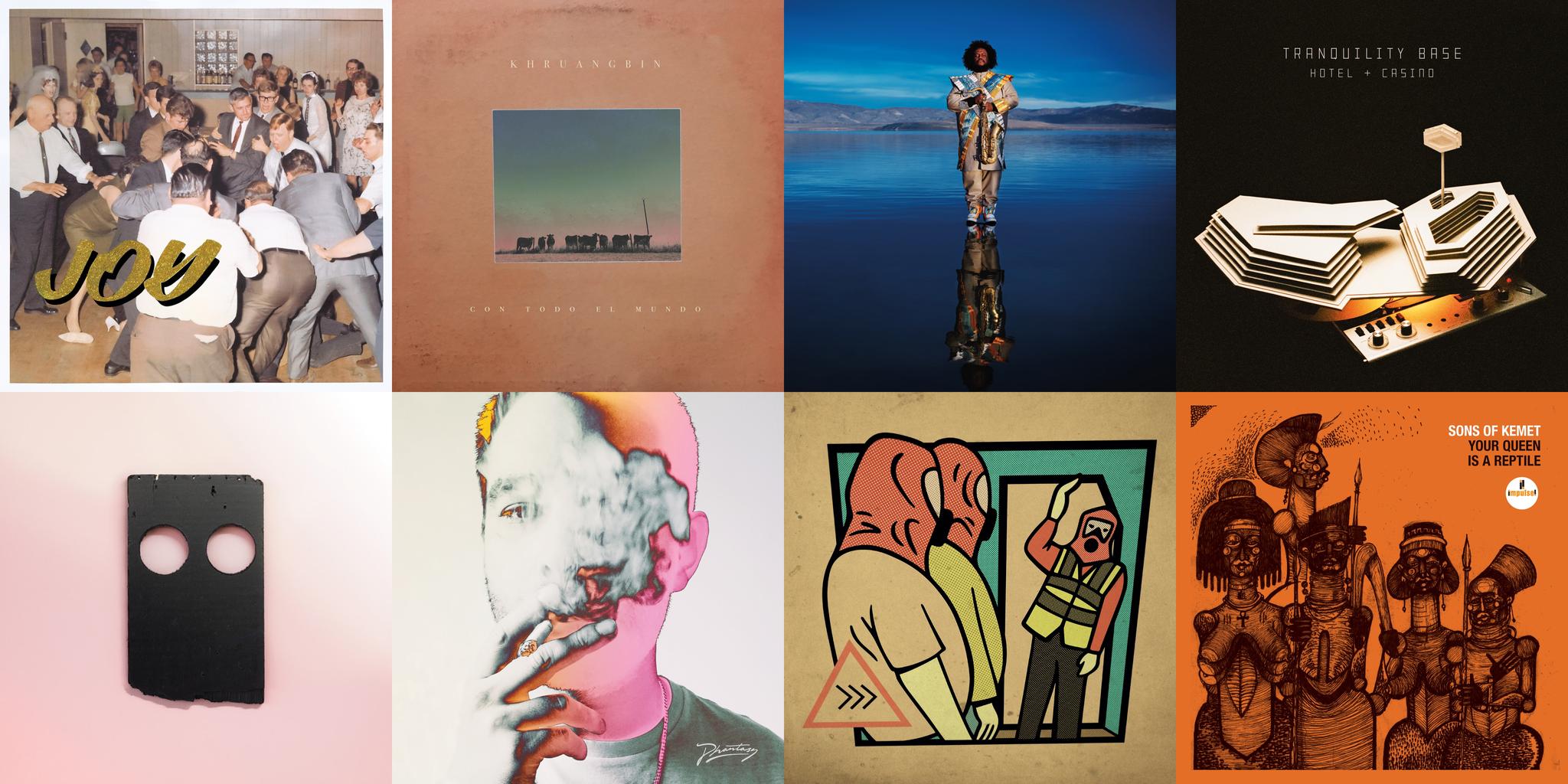
BBC Radio 6 Music's Albums of the Year 2018
What a year of music 2018 has been, but which albums have 6 Music presenters loved most?
Source


It’s a good eight minutes and most of two songs into the second album from this Houston, Texas trio before you hear any vocals, and by that point they may well be superfluous. Khruangbin (the name translates from Thai as “flying engine” or “airplane” and the former feels particularly fitting) make immaculate instrumental tracks that effortlessly accommodates psychedelic rock, Thai funk, Caribbean grooves, vintage funk, and Middle Eastern riffs. What makes *Con Todo El Mundo* (another translation, this time from Spanish: “for all the world”) so pleasurable is the way those touchstones tie together to create a singular, gratifying sound. Bassist Laura Lee deftly moves in and out of the beat, guitarist Mark Speer supplies long and supple runs, and drummer Donald “DJ” Johnson places a funk kick on the rhythm as these songs unfurl without undue stress. Like gears on a car, the three-piece can shift up into the sharp, reverb-heavy bite of “Maria También” or slow into a nocturnal, jazzy drift on “August 10.” The feel is mellow, but it’s never merely easy listening; the shifting melodies and pinpoint drum parts keep you focused on the many possibilities of this sound.


In 2016, Alex Turner received a piano for his 30th birthday and started playing seriously for the first time in over 20 years. Songs for Arctic Monkeys’ sixth album eventually emerged—a collection of brooding, cosmic lounge-pop that’s typical of the band only in its disdain for playing it safe. Here, light-years from their previous riff-driven adventures, melodies unspool slowly but stick faster with every listen. A watering hole on the moon provides the conceptual framework for Turner to muse on life, pop culture, and technology with heavy-lidded introspection. “I need to spend less time stood around in bars/Waffling on to strangers about martial arts,” he sighs on “She Looks Like Fun.” He shouldn’t be hasty: Wherever he finds inspiration, it takes his band to daring new places.

In 2018, Low will turn twenty-five. Since 1993, Alan Sparhawk and Mimi Parker—the married couple whose heaven-and-earth harmonies have always held the band’s center—have pioneered a subgenre, shrugged off its strictures, recorded a Christmas classic, become a magnetic onstage force, and emerged as one of music’s most steadfast and vital vehicles for pulling light from our darkest emotional recesses. But Low will not commemorate its first quarter-century with mawkish nostalgia or safe runs through songbook favorites. Instead, in faithfully defiant fashion, Low will release its most brazen, abrasive (and, paradoxically, most empowering) album ever: Double Negative, an unflinching eleven-song quest through snarling static and shattering beats that somehow culminates in the brightest pop song of Low’s career. To make Double Negative, Low reenlisted B.J. Burton, the quietly energetic and adventurous producer who has made records with James Blake, Sylvan Esso, and The Tallest Man on Earth in recent years while working as one of the go-to figures at Bon Iver’s home studio, April Base. Burton recorded Low’s last album, 2015’s Ones and Sixes, at April Base, adding might to many of its beats and squelch and frisson beneath many of its melodies. This time, though, Sparhawk, Parker, and bassist Steve Garrington knew they wanted to go further with Burton and his palette of sounds, to see what someone who is, as Sparhawk puts it, “a hip-hop guy” could truly do to their music. Rather than obsessively write and rehearse at home in Duluth, Minnesota, they would often head southeast to Eau Claire, Wisconsin, arriving with sketches and ideas that they would work on for days with Burton. Band and producer became collaborative cowriters, building the pieces up and breaking them down and building them again until their purpose and force felt clear. As the world outside seemed to slide deeper into instability, Low repeated this process for the better part of two years, pondering the results during tours and breaks at home. They considered not only how the fragments fit together but also how, in the United States of 2018, they functioned as statements and salves. Double Negative is, indeed, a record perfectly and painfully suited for our time. Loud and contentious and commanding, Low fights for the world by fighting against it. It begins in pure bedlam, with a beat built from a loop of ruptured noise waging war against the paired voices of Sparhawk and Parker the moment they begin to sing during the massive “Quorum.” For forty minutes, they indulge the battle, trying to be heard amid the noisy grain, sometimes winning and sometimes being tossed toward oblivion. In spite of the mounting noise, Sparhawk and Parker still sing. Or maybe they sing because of the noise. For Low, has there ever really been a difference?




From the first jangling sunshine chords on opening track ‘Mango’, Silver Dollar Moments announces itself as a proper piece of indie pop goodness. Then, across 45 minutes, it takes all kinds of turns, into ESG-ish yips and funk, dreamy-arch harmonies, disco synth-pows and stoner bongos, unsettling submerged voices - with all that and more it still flows like a fountain of indie pop, fresh and catchy and altogether. The album features the singles ‘I Only Bought It For The Bottle,’ ‘Let Your Dogtooth Grow’ and ‘Blue Suitcase (Disco Wrist).’
